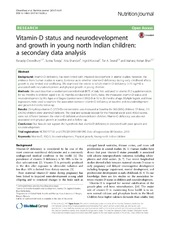Vitamin-D status and neurodevelopment and growth in young north Indian children: a secondary data analysis
Chowdhury, Ranadip; Taneja, Sunita; Bhandari, Nita; Kvestad, Ingrid; Strand, Tor A; Bhan, Maharaj Kishan
Peer reviewed, Journal article
Published version

Åpne
Permanent lenke
https://hdl.handle.net/1956/18039Utgivelsesdato
2017-09-18Metadata
Vis full innførselSamlinger
Originalversjon
https://doi.org/10.1186/s12937-017-0285-ySammendrag
Background: Vitamin-D deficiency has been linked with impaired development in animal studies; however, the evidence from human studies is scanty. Evidence as to whether vitamin-D deficiency during early childhood affects growth is also limited and conflicting. We examined the extent to which vitamin-D deficiency (<10 ng/ml) is associated with neurodevelopment and physical growth in young children. Methods: We used data from a randomized controlled trial (RCT) of daily folic acid and/ or vitamin B12 supplementation for six months in children aged 6 to 30 months conducted in Delhi, India. We measured vitamin-D status and neurodevelopment by the Ages and Stages Questionnaire-3 (ASQ-3) at 12 to 36 months of age. Multiple logistic and linear regressions were used to examine the association between vitamin-D deficiency at baseline and neurodevelopment and growth 6 months follow-up. Results: 25-hydroxy-vitamin-D (25OHD) concentration was measured at baseline for 960 (96%) children. Of these, 331 (34.5%) children were vitamin-D deficient. The total and subscale (except for the Personal social scale) ASQ-3 scores, were not different between the vitamin-D deficient and non-deficient children. Vitamin-D deficiency was also not associated with physical growth at baseline and at follow -up. Conclusion: Our data do not support the hypothesis that vitamin-D deficiency is associated with poor growth and neurodevelopment.
